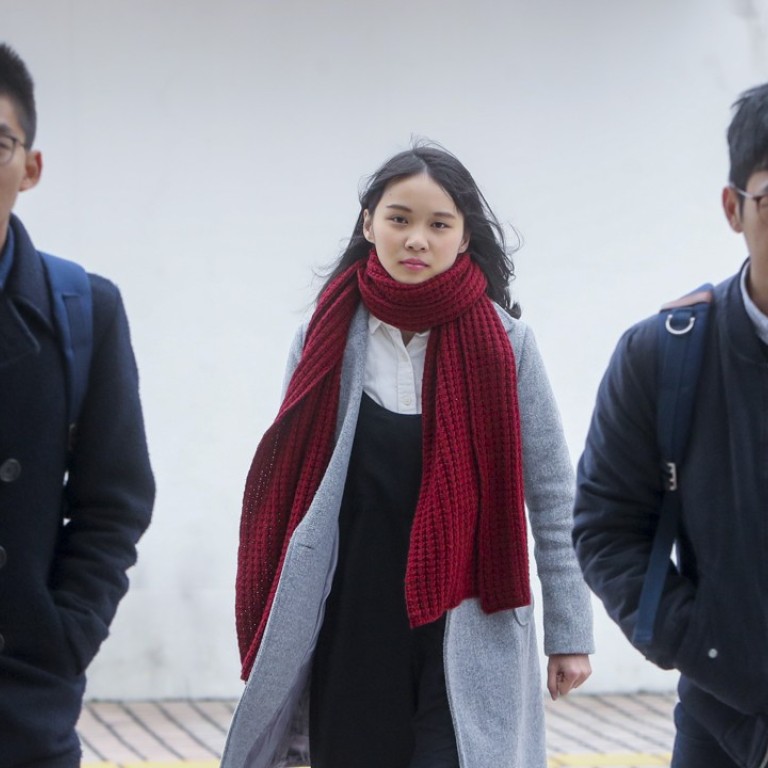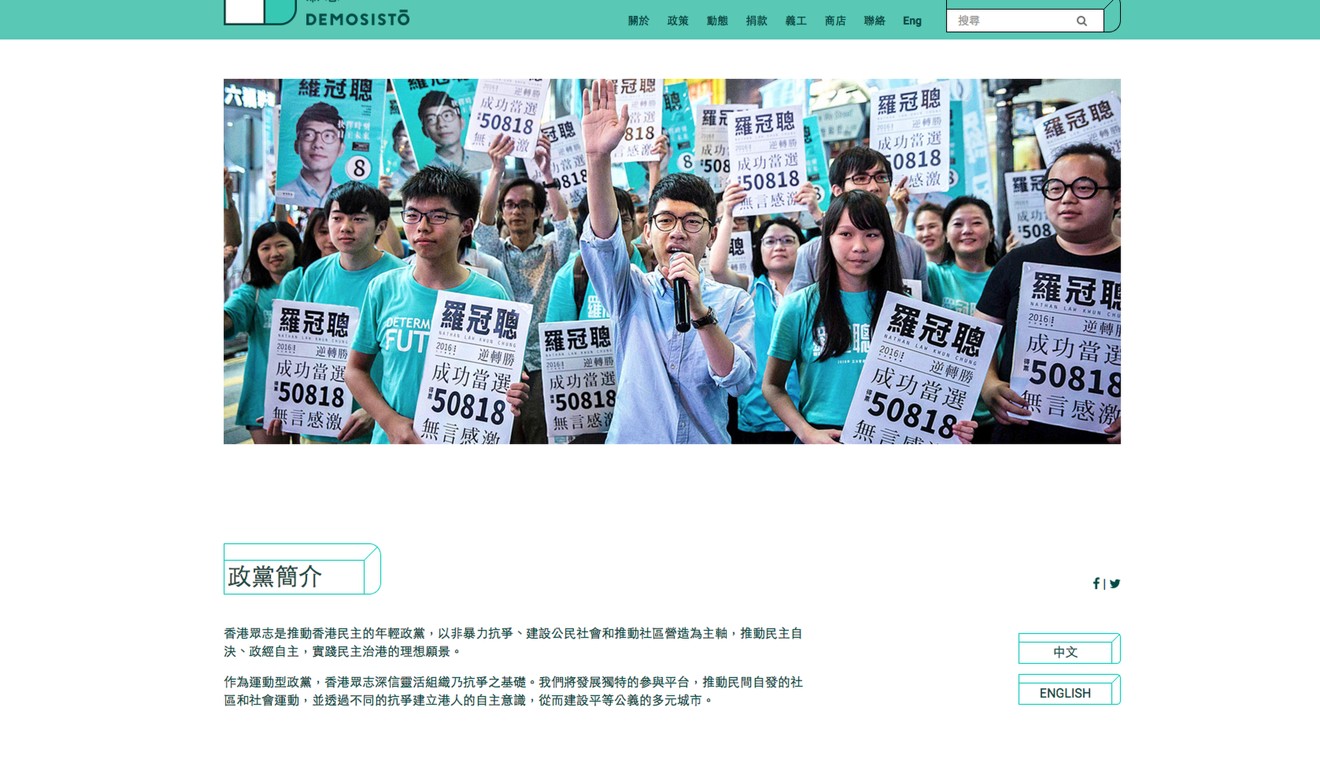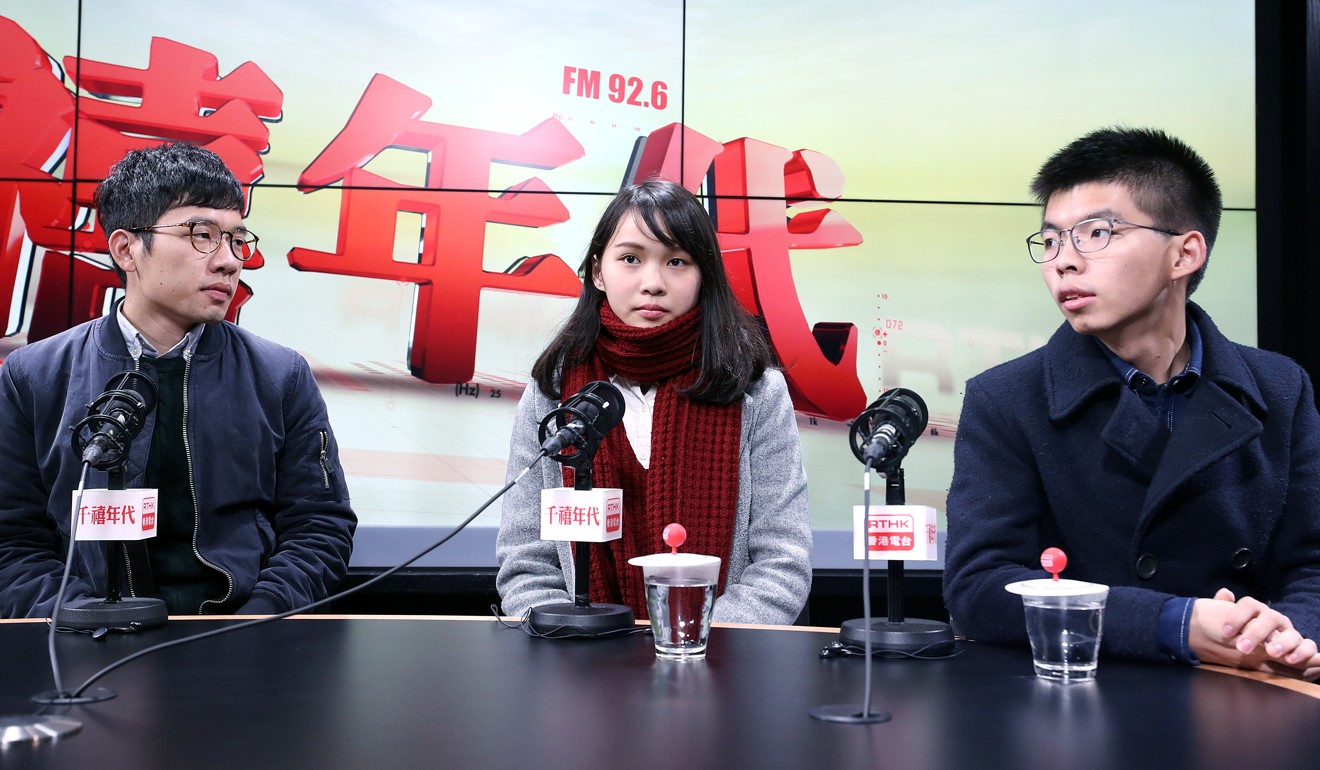
Demosisto political mission changes weren’t aimed at helping Agnes Chow get elected, Joshua Wong says
The pro-democracy activist said the tweaks to the Chinese website were based on ‘minor shifts’ after years of work, but pro-establishment figure Ronny Tong interpreted it as a sign that the party was beginning to understand ‘political realities’
Wong and fellow party leader Nathan Law Kwun-chung said the changes to the mission statement, made only on the Chinese version of the party’s website, were based on “minor shifts” after years of work and to make the statement more accessible to laypeople.
The changes were made after Chow submitted her candidacy on January 18.

The original Chinese version stated that Demosisto upheld “democratic self-determination” as its “highest doctrine”, opposed the Chinese Communist Party and called for a popular referendum to push for the city’s autonomy.
The updated version contains the phrase “democratic self-determination” but the other phrases were dropped.

Wong, on a radio programme, argued that the issue was not about whether the party had changed its doctrine but why the authorities were “vetting thoughts”.
“Even if we change our doctrine, the returning officer would still think we are not genuinely upholding the Basic Law,” he said, referring to the government official appointed to oversee the by-election.

News that Chow’s nomination was ruled invalid drew criticism from opposition politicians and legal experts but Hong Kong leader Carrie Lam Cheng Yuet-ngor insisted it had been done by the book.
“Any suggestion of ‘Hong Kong independence’, ‘self-determination’, independence as a choice, or self-autonomy, is not in line with Basic Law requirements, and deviates from the important principle of ‘one country, two systems’,” she said, referring to the city’s mini-constitution.
Agnes Chow’s disqualification does opposition a favour
As to why Law had been allowed to run for the Hong Kong Island seat in the 2016 Legco election, returning officer Anne Teng argued that each case must be considered on its own merits. She said she had taken into consideration recent developments such as Beijing’s interpretation of the mini-constitution that made improper oath-taking and failure to accept Hong Kong as an inalienable part of China punishable by disqualification.
That interpretation of the Basic Law by China’s top legislative body led to six pro-democracy lawmakers, including Law, losing their seats for failing to take their oaths of office properly.
Watch: what is the Basic Law of Hong Kong?
Law, on the same radio programme, stressed that the party would continue to call for “self-determination”, but said it was a “slippery slope” to tighten election eligibility criteria based on new developments.
“Do we need to say we uphold the Article 23 [national security] legislation in future? And further later … do we need to say we respect and embrace the rule of the Chinese Communist Party?” Law said.
Wong accused the authorities of having shifting goalposts on eligibility and said this meant the chances of Demosisto taking part in future polls were slim.
Since it could not enter the legislature, Demosisto would continue to be active in civil society and also alert the international community to their cause, Wong said.
At least 2,000 protest banning of pro-democracy activist Agnes Chow from Legco race
On a separate radio programme, a member of Lam’s cabinet, Ronny Tong Ka-wah, cheered Demosisto’s amendment to its political charter and said it was a sign that they were starting to understand political realities.
We are parking where we are allowed to park. But someone was sent to redraw a line claiming it was a restricted area and even imposed a penalty on us.
“You don’t have to give in to authoritarianism but you can do what you can within a legal framework to meet your political objectives,” he said.
“If you don’t accept [the system] I can’t imagine what you can do outside armed rebellion or violence … and society would not accept this.”
Tong defended the returning officer’s decision and said it was based on fact and reference to Demosisto’s political stance, of which Chow, a party member, clearly subscribed to.
While the same laws had always existed, he conceded that recent political events had made officials follow them more carefully.
He gave the analogy of rampant illegal parking in Hong Kong, where many motorists did it even though they knew it was illegal. They would blame the government for a lack of parking spaces in the city.
“On the surface, it appears to be a reasonable excuse but when the illegal parking starts to affect traffic, police say, ‘Sorry, we now have to seriously enforce illegal parking laws and issue tickets without prior warning’,” he said.
Law’s rebuttal to that analogy was: “We are parking where we are allowed to park. But someone was sent to redraw a line claiming it was a restricted area and even imposed a penalty on us.”
He added: “We are deprived of basic human rights under Beijing’s order and the changing political restrictions.”
Hong Kong delegate to China’s legislature vows to push local officials to enact national security legislation within five years
We are deprived of basic human rights under Beijing’s order and the changing political restrictions.
Tong was asked whether the stricter interpretation of eligibility criteria would also affect those who criticised controversial efforts to institute a national security law under Article 23 of the Basic Law. In 2003, the government was forced to scrap a plan to enact the legislation after half a million people took to the streets.
He said this was possible, adding: “If you are not someone who takes part in politics or engages in political commentary, you won’t reach a position where you can challenge or threaten the position of the Basic Law.
“But if this is the Legislative Council, which is part of the system, and you are advocating [the idea] that we do not have to follow Article 23, then it may be considered a sign that one is not willing to uphold the Basic Law.”


